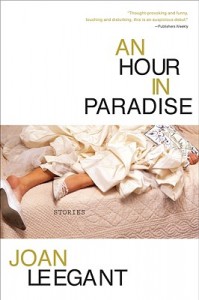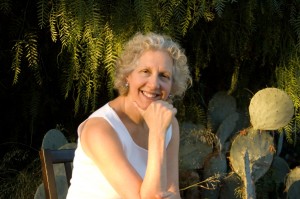 At age 53, Joan Leegant published her first book, the critically heralded story collection, An Hour in Paradise. With her debut novel, Wherever You Go, she has continued to prove her presence as a preeminent Jewish-American writer. Winner of the PEN/New England Book Award, the Wallant Award for Jewish Fiction, and the 2011 Nelligan Prize from the Colorado Review, she was also a Finalist for the National Jewish Book Award. For eight years she taught fiction writing at Harvard. Currently she divides her time between Boston and Tel Aviv, where she is the visiting writer at Bar-Ilan University.
At age 53, Joan Leegant published her first book, the critically heralded story collection, An Hour in Paradise. With her debut novel, Wherever You Go, she has continued to prove her presence as a preeminent Jewish-American writer. Winner of the PEN/New England Book Award, the Wallant Award for Jewish Fiction, and the 2011 Nelligan Prize from the Colorado Review, she was also a Finalist for the National Jewish Book Award. For eight years she taught fiction writing at Harvard. Currently she divides her time between Boston and Tel Aviv, where she is the visiting writer at Bar-Ilan University.
Jody Lisberger taught fiction at Harvard with Joan Leegant, and they were MFA students together at Vermont College. This interview recently took place over email.
In terms of moving from stories to a novel, do you think writing a collection of stories made the job of writing a novel easier? Did having those prizes under your belt for your first book create pressure for your second?
Readers and writing students sometimes assume that writing stories is “practice” for writing a novel—that you start “small” and then grow—but I think most writers would say that’s not the case at all. Stories as an art form have their own set of demands. And lest anyone suggest that short fiction is a lesser art, we can look to the work of such story masters as Alice Munro, Grace Paley and Edith Pearlman, who won the 2011 PEN/Malamud Award for the Short Story and whose latest collection, Binocular Vision, was just nominated for the National Book Award.
That said, while writing stories first didn’t make writing a novel easier for me, writing fiction for a long time before tackling this particular novel made a difference. I began writing fiction around 1990 and published Wherever You Go in 2010. That’s 20 years. I teach writing, and one of the hardest things I’ve had to do is tell a student he or she needs to master more of the craft before shackling him/herself to a big project. It’s not that writing stories is easier; it’s just that you can labor on a story for a few months and then put it aside and start another. This allows you to let go of what’s not working and move on.
I was very grateful to have received those prizes. I was 53 years old when the collection came out, and a lot of water had flowed under the bridge by then. When I turned to the novel, I didn’t experience the prize-winning as pressure but as affirmation. Permission to keep going. A prolific story writer once told me that with each story she published, she was given permission to write another one. That’s what kept her submitting and submitting. That’s what those prizes felt like for me.
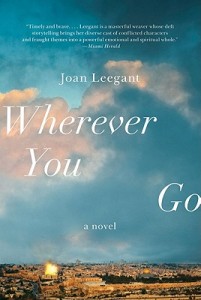 After writing stories, did you expect Wherever You Go to take seven years to complete? Why seven years?
After writing stories, did you expect Wherever You Go to take seven years to complete? Why seven years?
I don’t entirely recall what I was thinking when I began the novel, which was actually the second half of a two-book contract (the first was the story collection)—probably more along the lines of it taking three or four years. It’s hard to sometimes remember why it took so long. It’s a little like childbirth: you don’t remember the pain, otherwise you’d never do it again. Though I can point to some factors. First, I wrote an entirely different story for a few years, about a group of young women in Jerusalem. When I finished, I saw that it was kind of flat, but on the sidelines were a couple of antsy guys who were almost pacing the perimeter of the narrative, begging to be explored. Who were they? Why were they so agitated? They had a lot of potential. So I pulled them forward and began to write their story, and eventually they became two of the main figures in Wherever You Go. I think that was in year three or so.
I also didn’t work on the book for seven solid years straight. I took a long break from the manuscript at one point, due to a medical issue, which was immediately followed by a visiting writer stint in Israel. All told, I didn’t look at the manuscript for almost nine months. It was the best thing I could have done. When I returned from Tel Aviv and looked at the pages, I knew exactly what I had to do. I wrote straight through and sent it to my agent and that was that. I’m not one of those writers who plans or outlines anything beforehand—thinking about a story doesn’t work for me, I have to discover it in the writing—so I’m groping my way for a very long time. I’ve learned to more or less trust the process and not get too anxious when I don’t know where I’m going for years on end.
One craft challenge is that you tell the story through three distinct and alternating third person points of view. How did you decide to use this structure? Were there points where you questioned your decision? What are the pitfalls to his approach that you think fiction writers should consider? What about the pleasures?
When I was still writing the unsuccessful story of the Jerusalem women, I was experimenting with a kind of omniscience—and it wasn’t working. There was too much distance; I couldn’t sink into any of the characters. I was also indulging an ironic, almost comic tone that was keeping me from getting at the truth of these people’s lives. It was, in retrospect, something of a defense on my part. I think I was reluctant to get inside these people for fear of what I’d find. As I said, that story was a little flat, and the flatness was related to the overly distant point of view. When I started over with the sideline characters, I wrote them in third-person and everything began to flow.
In terms of the structure, I knew from the get-go that I’d be exploring more than one person and that I was interested in the circumstances in which their paths would cross. So that dictated the structure. Three voices has a nice symmetry; it also lends itself to the image of a braid, which is how I ultimately saw the back-and-forth nature of the chapters. If you’ve ever made a braided bread—not coincidentally, the traditional Jewish challah is a braided bread—you also know that often you start the braiding in the middle, at the point where the three strands overlap most powerfully. That’s how it felt when constructing this book. I sensed early on, without knowing the specifics of the narrative, that the three lives would cross when a major event happened in the middle of the book. That too dictated the structure, even before I knew what that event was going to be.
Which is not to say the braiding was straightforward or obvious. I was continually rearranging the alternating sections. For a time, I thought I’d give 50 pages of the first character before shifting to the next; then I thought that would be too trying for a reader so I shortened the number of pages the reader would have about Character A before moving to Character B. Then I feared that structure would be jumpy. I laid out sections on my floor and moved them around. At one point, I hung a clothesline across my writing room and hung sections by clothespins to see how they’d flow. I needed to know what the experience would be like for the reader—what the reader would know or not know, how the reader would encounter the characters in the various permutations. In the end, you just have to hope what you chose is workable and satisfying. No book can be perfect, or perfect for every reader.
Of the pleasures of this approach is that I enjoy reading a narrative with multiple voices. I like the interplay, the variety of tones and rhythms, the subtext that exists in the spaces between the voices. So being able to create such a narrative was deeply enjoyable. I loved inhabiting the different consciousnesses and being able to use a range of colors and tones.
One of the biggest lessons I try to teach students is how to recognize the intrusion of an omniscient voice into their third person stories and novels—a voice that keeps them from getting or staying close to their point-of-view characters. Do you have any particular advice for getting closer?
One thing is to get rid of your preconceptions about a character and allow the character to speak for herself and reveal herself in gestures and conduct. Or if you can’t get rid of your preconceptions, then at least be aware of them. Too often this sort of distancing occurs when we’re engineering the story and don’t want the characters to mess up our plans by being themselves. So we keep things on the surface where we, the writer, are in charge, even to the detriment of the narrative.
One way to get your characters to reveal themselves is to put them in a scene and listen to them talk and watch their body language. Students and early stage writers often think the only way to get inside a character is by giving his or her interior thinking, which can be done to excess where we hear every thought or internal curse word, when many times the most vivid revelations come by way of gesture: the drumming of fingers on the table, the picking at the food, the moment a character chooses to look out the window instead of answering a ringing phone. With gestures like these, you need only a brief or fleeting interior thought to accompany it—and it says volumes. Then you’re getting closer.
 I’m assuming there were some particularly difficult parts to write in the novel, given the presence of addiction, assault, exploding bombs and a devastating affair. Can you talk about how it felt to write these scenes? For instance, did Aaron stop short in his assault not only because he couldn’t go on but because you couldn’t? How much do you think a fiction writer should push herself to tell the ugly truths of people’s thoughts and actions?
I’m assuming there were some particularly difficult parts to write in the novel, given the presence of addiction, assault, exploding bombs and a devastating affair. Can you talk about how it felt to write these scenes? For instance, did Aaron stop short in his assault not only because he couldn’t go on but because you couldn’t? How much do you think a fiction writer should push herself to tell the ugly truths of people’s thoughts and actions?
I may have the opposite problem about telling ugly truths. I have a hard time illuminating the positive. One of the attractions of writing fiction for me is being able to illuminate the dark stuff, to write about the troubled and problematic. So I don’t have a problem with going there or writing about it, though I do have to watch that the tone is not overbearing for a reader.
Which points to a challenge I need to be aware of, which is to allow my troubled characters to rise above stereotype and their own darkness. For instance, an earlier version of the scene in which Aaron begins to assault the woman went substantially further. But then I realized that Aaron would never go that far; that he wasn’t such a bad kid, just a troubled kid. In writing about Regina, who is an addict, I discovered in the later drafts that the reader didn’t see enough of her other sides, her promise and brilliance, so I had to go back and add those to give a fuller picture. It was still the truth—that’s always the touchstone, you’ve got to write the truth—but I had left out some of the more positive elements in my desire to explore the darkness.
You didn’t mention how it felt to be exploding bombs and seeing people die in the novel. Care to comment?
Yes, there is a scene with a bombing. And it was—you’re correct—hard to write. I labored over those details. I wanted to get across the drama and gravity without making it gratuitously violent. I also needed it to be factually accurate. There was a point during my research when I wondered if the FBI would show up at my door because I was spending so many hours online reading about how to make bombs. And you are correct in flagging these as emotionally difficult scenes. I was sobered, as I was writing, by the enormity of what was taking place. I could see this invented building and garden and lawn in my head, and I could smell the burning.
You mentioned tone and coloration earlier. I find the tone of voice, assertion, and cadence that goes along with Aaron’s third person point of view to be particularly strong in an edgy, unnerving kind of way. Was this on purpose? Did you deliberately try to create different intensities or tones in the points of view? Was anyone’s point of view easier to write than another’s?
Thanks for that comment about Aaron’s voice. I loved writing that voice. His edginess and boldness were purposeful in that this was very clearly who Aaron was: a kid with a lot of issues and a lot of strong feelings, and not a lot of opportunity to express—or vent—earlier in his life. Feeding his voice was also a great deal of the political sentiment fueling the book. Aaron is angry and impatient with what he sees as excessively conciliatory views mouthed by either politicians or naive Americans who he believes don’t grasp the situation in Israel. I’ve heard these sentiments, heard voices like Aaron’s, so it was natural that he’d sound the way he does.
Yona’s was the hardest voice for me to write, the most reticent in terms of revealing herself to me. I think that’s because her story was the most personal. I had a much easier time with the two male characters—Aaron because he’s mouthing a lot of rhetoric, which I loved playing with, and Greenglass because his spiritual struggles were something I liked writing about. There are portions of his interior thinking that come straight out of some of the most beautiful Talmudic and biblical passages, and I loved writing those.
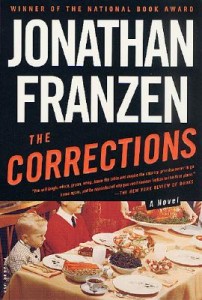 Though the three main characters have distinct sensibilities and yearnings—spiritual, psychological, ideological—which, in turn, lend themselves to different shadings and tones, there were times in the drafts when I had to modify the voices so they wouldn’t sound so similar. For instance, each character has problems with their fathers, and I had to work on that so the narrative wouldn’t be repetitive. As I said earlier, I like novels with multiple voices, but writers have to be careful that the voices have variety. I read Jonathan Franzen’s The Corrections twice while working on this novel, mainly for the unplugged voices that carry that book. Those voices gave me permission—again, that word—to unplug my own characters’ voices. I also saw in The Corrections that I knew instantly whose consciousness was behind any given section because the voices were so vivid. Vividness is important. You want your reader to not just know your characters and be interested in their story but to be enlivened by the narration. You want them to be eager to hear those voices ringing off the page.
Though the three main characters have distinct sensibilities and yearnings—spiritual, psychological, ideological—which, in turn, lend themselves to different shadings and tones, there were times in the drafts when I had to modify the voices so they wouldn’t sound so similar. For instance, each character has problems with their fathers, and I had to work on that so the narrative wouldn’t be repetitive. As I said earlier, I like novels with multiple voices, but writers have to be careful that the voices have variety. I read Jonathan Franzen’s The Corrections twice while working on this novel, mainly for the unplugged voices that carry that book. Those voices gave me permission—again, that word—to unplug my own characters’ voices. I also saw in The Corrections that I knew instantly whose consciousness was behind any given section because the voices were so vivid. Vividness is important. You want your reader to not just know your characters and be interested in their story but to be enlivened by the narration. You want them to be eager to hear those voices ringing off the page.
Curious that you mention characters’ problems with their fathers. The novel is hugely about the Israeli-Palestinian crisis, but do you also want readers to see this novel as ahistorical and about father-child disappointments? Did you intend the novel to weigh so heavily on fathers? From the start were you deliberately reaching for something more personal than political, or did that sort of just come about on its own?
No question that father-child relationships weigh heavily in this book. I didn’t put the father issue in there—just as I didn’t put the Israeli-Palestinian issue in there—but that’s what the characters were about and that’s where they brought me. When I said earlier that I’m one of those writers who doesn’t plan, I’m also one of those who doesn’t know what the themes or complications are going to be until the story is underway, until it’s being written. Once I began to explore Aaron and Greenglass, it was apparent that he had a troubled relationship with his famous novelist father. And once I had Greenglass walk into his parents’ New York living room and look around, I discovered he had a fraught dynamic with his father, too. So the family issues were right there alongside the political ones, and they grew up organically around the characters.
The family stories are as important to me as the political elements. Not surprisingly, they’re also connected. Our personal histories drive our choices, including political choices that may, on the surface, look like they’re based entirely on ideology but in truth are also based on psychology. That is what ultimately emerged while writing the book.
In trying to listen to your characters, what has been the hardest thing about writing fiction for you, if you can focus on just one thing?
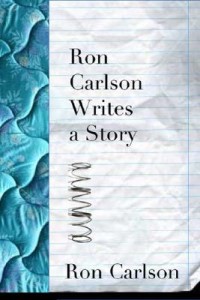 Probably the hardest thing has been wanting to know what their story is before they’re ready to tell me. Or, as Ron Carlson put it so well in his book Ron Carlson Writes A Story, before the characters even know the story. Carlson talks about needing to “survive” the writing of the story, meaning needing, as the writer, to just stay there in the room, at the desk, in the chair, and wait. This is the hardest part.
Probably the hardest thing has been wanting to know what their story is before they’re ready to tell me. Or, as Ron Carlson put it so well in his book Ron Carlson Writes A Story, before the characters even know the story. Carlson talks about needing to “survive” the writing of the story, meaning needing, as the writer, to just stay there in the room, at the desk, in the chair, and wait. This is the hardest part.
I don’t mean only ignoring the impulse to get up for more coffee or to vacuum the rug or check your email. I mean the impulse to leap at some glimmer of an inkling about the storyline and then rush to create a whole narrative out of it because you can’t stand spending one more minute in the state of not-knowing. Carlson counsels staying close to the details your sentences offer you—someone walks over to a window: great: What does he see? Maybe that will help the narrative unscroll. It’s painstaking. That’s why I think so many writers want to outline. But I’m like Carlson; he says he can’t think his way through it. He has to wait for it to come out in the writing. That’s the hardest part. To sit in the chair and wait.
Aaron’s father churns out popular but melodramatic potboilers about the Holocaust. How did it feel to take on this theme? The novel is also risky in rendering a less than flattering picture of Jewish extremists in the West Bank. Were you worried how that might be taken by Jewish-American readers? As an American Jew yourself, who albeit lives and teaches in Israel for a portion of each year, were you worried about not getting the sensibilities right and being viewed as a literary interloper?
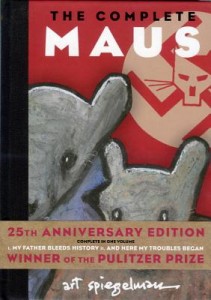 The use of the Holocaust for art is a loaded but important topic. There’s a lot of excellent literature that takes the Holocaust as its subject, for instance, Maus, by Art Spiegelman. But there is also a lot of not such excellent literature on the subject, and I ask myself where the line is, and what makes work exploitative and what makes it okay. I think we have to be careful about writers suddenly finding the Holocaust “rich” or “art-worthy.” I don’t mean to suggest that the only people allowed to touch the Holocaust must be, like Elie Wiesel, survivors. Rather, my concern is with what happens when the events themselves recede into history and become, instead, “mere” subjects to be used by writers interested in them primarily for what they offer in the way of built-in drama. Or, worse, for what they offer writers like Aaron’s father, which is built-in sympathy.
The use of the Holocaust for art is a loaded but important topic. There’s a lot of excellent literature that takes the Holocaust as its subject, for instance, Maus, by Art Spiegelman. But there is also a lot of not such excellent literature on the subject, and I ask myself where the line is, and what makes work exploitative and what makes it okay. I think we have to be careful about writers suddenly finding the Holocaust “rich” or “art-worthy.” I don’t mean to suggest that the only people allowed to touch the Holocaust must be, like Elie Wiesel, survivors. Rather, my concern is with what happens when the events themselves recede into history and become, instead, “mere” subjects to be used by writers interested in them primarily for what they offer in the way of built-in drama. Or, worse, for what they offer writers like Aaron’s father, which is built-in sympathy.
The novel also touches on another use of the Holocaust that is very touchy. And that’s the use of the Holocaust for bolstering Jewish identity. It’s an issue much discussed in Israel, which carries deep and abiding scars of the Holocaust since so many of its citizens were and are survivors, and where many are saying we need to look at the shadow side of this self-identity. That shadow side is explored in the book through Aaron and his need to see the Palestinians as the new Nazis, i.e., the archetypal enemies of the Jews, and how that colors his thinking and drives his conduct.
As for my portrayal of Jewish extremists on the West Bank, I did worry how American Jewish readers would respond, though I have to admit I loved writing that material. These are ideologues and radicals; they live for their cause and are certain of the rightness of it and use pretty startling rhetoric. Actually, I’ve been fascinated by radicals ever since I was a student in the sixties. Their commitment, their passion, their ability to rationalize violence: who are these people? What allows them to justify what they do? I wanted to find out, so I wrote about them.
Fortunately, my concerns about American Jewish readers turned out to be largely unfounded. American Jews are sophisticated about Israel. They aren’t looking to read another Exodus.
That said, it was imperative that I get the details right and capture the sensibilities, and not come across as some carpetbagger or interloper writing about Israel from an American perch without sufficient insight into the society. I’ve spent a lot of time in Israel in the last decade, either traveling there or teaching there, and I lived there for three years in the late 1970s, but, still, one worries. One of the most gratifying reviews came from an Israeli magazine that said it was hard to tell I wasn’t a native Israeli since I’d gotten the pulse of the country so right. That was enormously meaningful to me.
 How do you think your starting to write fiction later than some people might have played into helping you write this novel? You had a career as a lawyer before taking up fiction at the age of 40. Does that experience make a difference? Did you ever feel discounted as a writer, or taken less seriously?
How do you think your starting to write fiction later than some people might have played into helping you write this novel? You had a career as a lawyer before taking up fiction at the age of 40. Does that experience make a difference? Did you ever feel discounted as a writer, or taken less seriously?
There are a lot of myths out there about writing, including that if you’re a real writer, it’s all you’ve ever wanted to do. And the converse: that if you pursued something else, you’re not the real thing. Then I think of the poet Wallace Stevens, who was a vice-president at an insurance company and apparently enjoyed it, or William Carlos Williams, a doctor. Or Chekhov, for that matter, another doctor. Or Annie Proulx, who first published in her 50s. Some of that myth-making is propagated by the media and our youth-obsessed society, which then seeps into the literary culture. I once got an excruciatingly apologetic email after my story collection came out, asking me for my age, because I was being considered for a prize as an “emerging writer” but the cut-off was something like 39. I was 53.
More disturbing than my own personal encounter with these myths is what it says about our society. It takes time to develop one’s craft and to find one’s voice. Not everyone is going to start doing that at age 22 or 25; not everyone has the financial luxury or life conditions at a relatively young age to allow them to spend years honing their craft either on their own or through continued schooling. This was put forth most trenchantly by the brilliant writer Tillie Olsen in her 1978 bookSilences , where she talked about why there are so few women’s voices in the literary canon, along with other voices at the bottom of the economic ladder. Which was where Olsen lived and struggled. Her fiction is extraordinary—her novella Tell Me A Riddle is deservedly a classic—but her output was small. Her life did not readily yield up the conditions for writing. This had nothing to do with her talent, her commitment, or her drive, and everything to do with the realities of her situation.
We all have situations we have to work with and around in order to do our writing. Economic pressures, family needs, illness, psychological hurdles, even—dare I say it?—other interests. Grace Paley was a political activist all her life and said that writing short stories and poetry, versus novels, suited her because it allowed for that. Piling on myths to make us further question our commitment or ability or talent is not helpful.
As to whether starting to write fiction later than some (most?) helped me write this novel, I don’t know. But I sometimes joke that one of the plusses of starting when I did is that, during the long years before I published anything, I didn’t have my parents looking over my shoulder and telling me to give up and go to law school already. Because I’d already done that.
Would it be fair to say that once you’re on the promotion road, nobody much cares about how old (or young) you are? What has been your experience in promoting Wherever You Go? Do you have advice for fiction writers, who nowadays realize that promotion is part of the job?
I know many writers dread or, at best, approach the promotional side of things with the same enthusiasm one reserves for a root canal, but there have been numerous unexpected pleasures for me associated with these efforts. Actually, the age factor has been one of them. Audiences at book talks tell me they find my relatively late foray into fiction inspiring, or at least interesting. People want to hear about risk-taking.
Overall, I’ve found the promotion to have a lot of upsides. One has been experiencing the generosity of other writers, who’ve put me in touch with reviewers or invited me to author events or, like you, hosted me at their campuses. It’s also been uplifting to meet so many readers. I gave more than a hundred book talks in the year after Wherever You Go was published, and though we wring our hands saying nobody is reading serious fiction, that hasn’t been my experience. I’ve also discovered the vast world of book bloggers, people who read and write about books not for pay or professional advancement but out of the sheer love of reading. Which is pretty amazing. They’ve been very generous in their response to Wherever You Go, posting thoughtful and often wonderfully written reviews, many saying the subject matter was entirely new to them. All of this has been tremendously heartening and one way to combat the sometimes punishing toll that publishing can take on one’s spirit, where you’re at the mercy of critics or your book is ignored in the press or an Amazon reviewer has been mean to you or you’re enduring any number of the myriad ups and downs that exposure can bring.
I think fiction writers need to adjust their expectations about what their publisher can and cannot do in the way of promotion, and then decide how much they want to take on for themselves. Time spent on promotion—and it takes time, no question—is time not spent writing fiction; on the other hand, if you devote five or seven years to writing a novel, you may decide it’s worth devoting one more to getting the word out so that readers who’d be interested in your book will hear about it. I also think many of us suffer from a romanticized notion of what publishers used to do for writers back in the day. In fact, not every writer was sent on “the book tour,” and often those tours were terrible—near empty bookstores, inappropriate venues. Because of the Internet and the shift to a greater egalitarianism in the reviewing world, there are now many more opportunities for writers to get their work out there than there used to be. Rather than bemoaning a somewhat mythical past, I say we should seize the bull by the horns and be glad for such robust online activity around writing and literature and books.
Dare I ask, what do you suppose the bloggers will be blogging about for your next book? Can you tell us a little about it?
I’ve got a very early stage novel underway set in central Massachusetts about late middle-aged people who leave their conventional lives, where they did all the “right” things, to form a commune with the goal of making their lives truly their own before it’s all over. Talk about the psychological driving your choices. I’m 61 years old. This is much on my mind.
In closing, can you speak specifically to what you had in mind in calling this novel Wherever You Go? As you set out to write a new novel, do you suppose you are seeking to take us to the same “place”? What do you think we as writers and readers need or want to find, wherever we go?
The title comes from a famous passage in the biblical Book of Ruth in which Ruth, the Moabite, pledges allegiance to her mother-in-law Naomi after the men who bound them together have all died: “Wherever you go, I will go. Wherever you lodge, I will lodge. Your people will be my people, and your God my God. Where you die, I will die, and there I will be buried.” It’s a poetic passage that invokes loyalty—to a person, a land, and a God. Which is, of course, one of the main themes explored in the book, the idea of committing oneself to a particular land and a particular vision of God’s plan, whatever the cost. I wanted to hint at the underside of that unconditional loyalty, suggest there’s a steep price to be paid for such fealty.
But, as you imply in your question, “wherever you go” has many meanings. This is a story about expatriates and individuals seeking to reinvent themselves in a new place, who take their baggage—literal and metaphorical—with them wherever they go. The question of how much your past drives your present is also one that the book wrestles with, the tension between the old and the new.
Until you posed this question, I hadn’t thought about the phrase “wherever you go” relating to what a fiction writer does for a reader, by being a kind of guide or, perhaps more aptly, a siren, luring them to go where we want them to go, asking them to accompany us on a journey. There is definitely something to that in the pact we make as writers with readers: I’m going to tell you the truth, but it will be through the means of invention. This requires that we as writers have to earn the reader’s trust and cooperation. We have to write with authority—get the details right, stay true to the characters, use all our powers of observation so that we illuminate the human condition with honesty and insight and compassion. This is the reader’s right. All of us— readers and writers—should settle for no less.



